|
|
|
Sort Order |
|
|
|
Items / Page
|
|
|
|
|
|
|
| Srl | Item |
| 1 |
ID:
129978
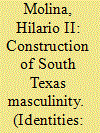

|
|
|
|
|
| Publication |
2014.
|
| Summary/Abstract |
I contend that masculinity formation in South Texas is linked to objects that have been deemed as 'manly'. This study is significant because it examines a group in the US population that, according to census predictions, account for a large percentage of the fastest growing and largest Latino group in the United States. This autoethnography research examines how pico de gallo - a type of salsa - and the barbeque grill assist working-class Mexican American males in constructing a masculine identity known as macho. The data are based on observing 30 social events in the Rio Grande Valley. The findings reveal a pursuit for an apex status of macho through these objects and the cultural transmission of gender roles to the next generation of males. This study concludes by offering suggestions in examining how masculinity, for men of colour, might be linked to marginalisation practices within a social structure.
|
|
|
|
|
|
|
|
|
|
|
|
|
|
|
|
| 2 |
ID:
178889
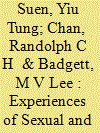

|
|
|
|
|
| Summary/Abstract |
While China's Constitution says everyone is treated equally before the law, employment discrimination continues to exist. This paper breaks new ground by analysing a quantitative survey of more than 10,000 lesbian, gay, bisexual, transgender and intersex (LGBTI) people, the largest dataset of its kind to date in China. Only 5.1 per cent of respondents were completely open about their gender and sexuality at work. More than one-fifth reported experiencing negative treatment in the workplace. Transgender and intersex people reported higher rates of negative treatment, as did respondents with lower educational levels and lower incomes and those residing in towns. Employer policies against discrimination were rare, but when in place, they were significantly associated with less negative treatment. These findings highlight an almost completely neglected segment of the workforce and document discriminatory experiences that could be addressed by changes in discrimination law and by employer policies and practices related to diversity and inclusion.
|
|
|
|
|
|
|
|
|
|
|
|
|
|
|
|
| 3 |
ID:
187813
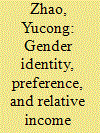

|
|
|
|
|
| Summary/Abstract |
In this paper, we empirically study the impact of gender identity on wives' relative income within households in China and find that a husband's and a wife's traditional gender identity statistically significantly and negatively affect the wife's relative income in the household. The heterogeneous effects of gender identity for different residence types, education levels, and age groups are also studied. Supporting empirical evidence is explored for the preference mechanism that couples with traditional gender identities are more averse to having a wife who earns more than her husband. We also find that a husband earns less if the husband or the wife has a traditional gender identity.
|
|
|
|
|
|
|
|
|
|
|
|
|
|
|
|
| 4 |
ID:
124973
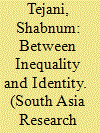

|
|
|
|
|
| Publication |
2013.
|
| Summary/Abstract |
Recent attention to the history of constitution-making in India reflects ongoing concerns about the difficulties and limitations of India's secular, democratic experiment. Scholars assessing India's secularism have pointed to the failure to separate the state from its involvement in religion from the outset. Through a study of the Constituent Assembly debates, this article suggests that the emphasis on 'religion' as the problem for secularism has been a distraction, taking the gaze away from the substantive arguments minorities were making about how their equal citizenship should be guaranteed. It remained unclear what recognition of 'minority' status was meant to achieve in postcolonial India and what it signified. In failing to recognise the claims of religious minorities for their equality, the Constituent Assembly reified their position as permanently unequal communities in the newly independent state.
|
|
|
|
|
|
|
|
|
|
|
|
|
|
|
|
| 5 |
ID:
108326
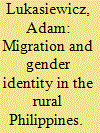

|
|
|
|
|
| Publication |
2011.
|
| Summary/Abstract |
Remittances associated with labor migration have been hailed by many as the most direct form of development to rural migrant-sending areas of the Global South, but focusing only on the quantity of cash flows does little to contextualize how migration has transformed social structures in rural areas. Through a qualitative focus on divisions of agrarian labor and decision-making, this article illustrates how the out-migration of men from rural areas of the Philippines is challenging preexisting gender ideologies of agricultural labor. The article examines how wives "left-behind" by their migrant husbands negotiate forms of farm work and responsibility that are culturally prescribed as "masculine." While a number of studies have detailed how female migration can destabilize conventional gender roles-as housebound husbands are shown to take up social reproductive work often considered "feminine"-the impacts of male migration on the participation of housebound wives in productive farming practices has been less studied. This article presents several vignettes of stay-at-home mothers who venture into farming and it analyzes how these women interpret their own gender identity.
|
|
|
|
|
|
|
|
|
|
|
|
|
|
|
|
| 6 |
ID:
127144
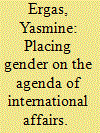

|
|
|
| 7 |
ID:
131522
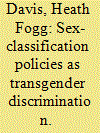

|
|
|
|
|
| Publication |
2014.
|
| Summary/Abstract |
Sex-classification policies are unjust because they prompt and authorize administrative agents to use their own subjective gender judgments to target, inspect, and exclude transgender-appearing people from the public accommodations under their watch. The vast majority of sex-classification policies are not rationally related to legitimate policy goals because there is no objective, socially agreed upon test for determining who is male and who is female, and legitimate policy goals such as fraud prevention, safety, security, and privacy can almost always be met more effectively by alternative means that do not subject people to gender inspection. I make a legal-normative argument for using gender-identity antidiscrimination laws to abolish sex-classification policies. I ground this radical proposal in a modified liberalism that treats sexual self-definition as an integral feature of liberal self-definition. Gender and intersectionality theorists rightly point out the deep structure of race-sex-class perception and oppression, but many of these theorists are too quick to dismiss the radical potential of gender-identity discrimination laws to eliminate, rather than modify, longstanding sex-classification policies. Racial, class and gender perception intersect to generate the possibility, rather than the inevitability, of invidious sex administration. And that is more than enough reason to abandon sex-classification policies.
|
|
|
|
|
|
|
|
|
|
|
|
|
|
|
|
| 8 |
ID:
175150
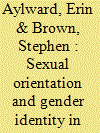

|
|
|
|
|
| Summary/Abstract |
Canada’s Feminist International Assistance Policy (FIAP), launched in June 2017, marks the first time that sexual orientation and gender identity (SOGI) have been mentioned in an overarching Canadian aid policy. The inclusion of SOGI in the policy document sent an important signal to domestic and international development partners on the need to consider these sources of discrimination and marginalization. This article asks two basic research questions. First, what is the place of SOGI in Canada’s “feminist” international assistance? Second, what additional steps does Canada’s development program need to take to protect the rights of lesbian, gay, bisexual, transgender, and intersex (LGBTI) people in the Global South? Based on an analysis of official documents and secondary sources, we argue that FIAP itself sends only a weak signal about the importance of SOGI-related concerns, but Canadian foreign aid has expanded its understanding of LGBTI issues and has begun to commit dedicated resources to addressing them. Nonetheless, the initial programming (2017–2019) was channelled in an ad hoc manner and through one, major stand-alone commitment, rather than through a broader framework that would guide SOGI’s integration into Canadian programs over the long term. If serious about addressing LGBTI rights more systematically, the Canadian government needs to expand its definition of what SOGI entails and move beyond niche programming to recognize the cross-cutting dimension of LGBTI rights in foreign aid, especially in the area of sexual and reproductive health and rights.
|
|
|
|
|
|
|
|
|
|
|
|
|
|
|
|
| 9 |
ID:
095924
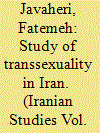

|
|
|
|
|
| Publication |
2010.
|
| Summary/Abstract |
Although transsexuality and change of sex might be considered a matter of personal choice, they have some socio-cultural causes and consequences. This article aims to examine these through the illustration of transsexuality in Iran. To this end, firstly, sexual transition and the legal system in Iran will be explained. Secondly, the methodology will follow. This study uses the survey method with two separate samples: 1) transsexuality policy makers and 2) forty individual cases of transsexuals. The findings reveal that while the Iranian legal system does not ban transsexuality and sexual transition, transsexuals suffering from gender identity disorder do encounter some social and cultural problems both in their private lives and publicly. The paper concludes with a summary of research findings, and sets out recommendations and study limitations.
|
|
|
|
|
|
|
|
|
|
|
|
|
|
|
|
| 10 |
ID:
189923
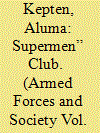

|
|
|
|
|
| Summary/Abstract |
How does secrecy shape narratives of militarized hegemonic masculinity? This article assesses a gap at the intersection between theories of masculinities and organizational secrecy. Supported by 15 interviews with current and former male workers of a covert section of an Israeli national security organization, it argues that secrecy is experienced as both an external hurdle and a central component to the way that men internalize masculinity. Unable to access social capital outside the security organization, the respondents of the study construct a social field inside it through which they can assert their masculinity. They do so by conceptualizing their jobs, themselves, and the organization through a prism of sacrificial warriorhood, and actively incorporate secrecy’s constraints into a narrative of “super-men”. This study thus examines secrecy in the context of a militarized environment, showing the experience of masculinity and a perceived lack of power-access among members of a dominant group.
|
|
|
|
|
|
|
|
|
|
|
|
|
|
|
|
| 11 |
ID:
187763
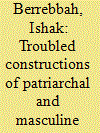

|
|
|
|
|
| Summary/Abstract |
This article introduces the complex and troubled constructions of Arab masculine and patriarchal identities depicted in Laila Halaby’s West of the Jordan, as told from the gaze of the novel’s female protagonists. It suggests that the politics of Arab male characters’ gender identity entail convoluted understandings, projecting them in both the diaspora and the homeland. The analysis in this article put flesh on the bones of some central questions regarding what problematises and affects masculinity and patriarchy in an Arab context. In addition to analytical and critical approaches to the novel, this article relies on a socio-cultural constructionist approach based on the perspectives of critics and theorists such as Raewyn Connell, Fadia Faqir, Fatima Mernissi and Homi Bhabha.
|
|
|
|
|
|
|
|
|
|
|
|
|
|
|
|
| 12 |
ID:
161771
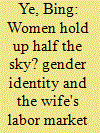

|
|
|
|
|
| Summary/Abstract |
In this paper, we empirically study the impact of gender identity on the wife's labor supply in China where a high female employment rate and a large population that has a traditional gender identity coexist. We find that the wife's gender identity affects her labor force participation for all cohorts, and the wife's gender identity affects earnings only for rural cohorts. The impact of gender identity varies among generational, regional, and educational cohorts. Husbands still guide their wives, i.e., a husband's gender identity affects his wife's labor force participation and earnings.
|
|
|
|
|
|
|
|
|
|
|
|
|
|
|
|
|
|
|
|
|